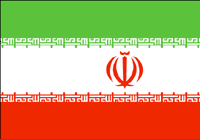Iran declares it is ready for talks with United States over Iraq
A top Iranian official said Thursday that Tehran was ready to open direct talks with the United States over Iraq , marking a major shift in Iranian foreign policy a day after a top Iraqi leader called for such talks.

Ali Larijani, Iran 's top nuclear negotiator and also secretary of the country's Supreme National Security Council, told reporters that any talks between the United States and Iran would deal only with Iraqi issues.
But any direct dialogue between Tehran and Washington were it to happen could also be a beginning for negotiations between the two foes over Iran 's controversial nuclear program.
There was no immediate response from Washington , which has repeatedly accused Iran of meddling in Iraq 's affairs and of sending weapons and men to help insurgents in Iraq .
"To resolve Iraqi issues and help the establishment of an independent and free government in Iraq , we agree to (talks with the United States )," Larijani told reporters after a closed meeting of the parliament Thursday.
Larijani said the U.S. Ambassador to Iraq , Zalmay Khalilzad, had repeatedly invited Iran for talks on Iraq .
His statement marked the first time since the 1979 Islamic Revolution that Iran had officially called for dialogue with the United States , which it has repeatedly condemned as "the Great Satan."
The proposal to hold direct talks on Iraq came in response to a request from senior Iraqi Shiite leader Abdul-Aziz al-Hakim, who on Wednesday called for Iran-U.S. talks on Iraq .
Al-Hakim has close ties to Iran , and heads one of the main Shiite parties in Iraq , the Supreme Council for the Islamic Revolution in Iraq .
"I demand the leadership in Iran to open a clear dialogue with America about Iraq ," al-Hakim said. "It is in the interests of the Iraqi people that such dialogue is opened and to find an understanding on various issues."
Larijani said Iran will officially name negotiators for direct talks with the United States but declined to give further details.
"These talks will merely be about resolving Iraqi issues," he told the parliament.
It was not immediately clear which Iraqi issues Larijani wanted to address. But the United States has repeatedly accused Iran of meddling in Iraq 's affairs, and even sending weapons and fighters to help the insurgency.
U.S. Defense Secretary, Donald Rumsfeld, recently said Iran 's Revolutionary Guards had been assisting the smuggling of explosives and bomb-making material into Iraq .
Iran has denied the U.S. charges, saying the occupying forces were responsible for the instability in Iraq .
Iran also has expressed grave concerns about the prospect of more violence in Iraq , where bloody sectarian fighting and reprisal killings have broken out in recent weeks.
The United States broke diplomatic relations with Iran in 1979 after the U.S. Embassy in Tehran was seized by students to protest Washington's refusal to hand over Iran's former monarch to Iran for trial. Militant students held 52 Americans hostage for 444 days.
Tehran-Washington relations began thawing after the 1997 election of former President Mohammad Khatami, who called for cultural and athletic exchanges to help bring down the wall of mistrust between both countries.
But relations worsened after U.S. President George W. Bush named Iran as part of an "axis of evil" and after the election of hard-line Iranian President Mahmoud Ahmadinejad and growing differences over Iran 's nuclear activities.
The U.S. accuses Iran of using its civilian nuclear program as a cover to build atomic bomb but Tehran denies this, saying its nuclear program is geared merely toward generating electricity, not a bomb, reports the AP.
D.M.
Subscribe to Pravda.Ru Telegram channel, Facebook, RSS!


